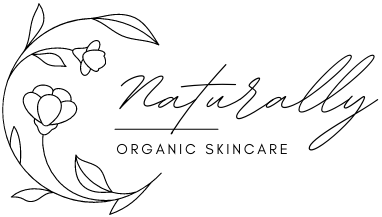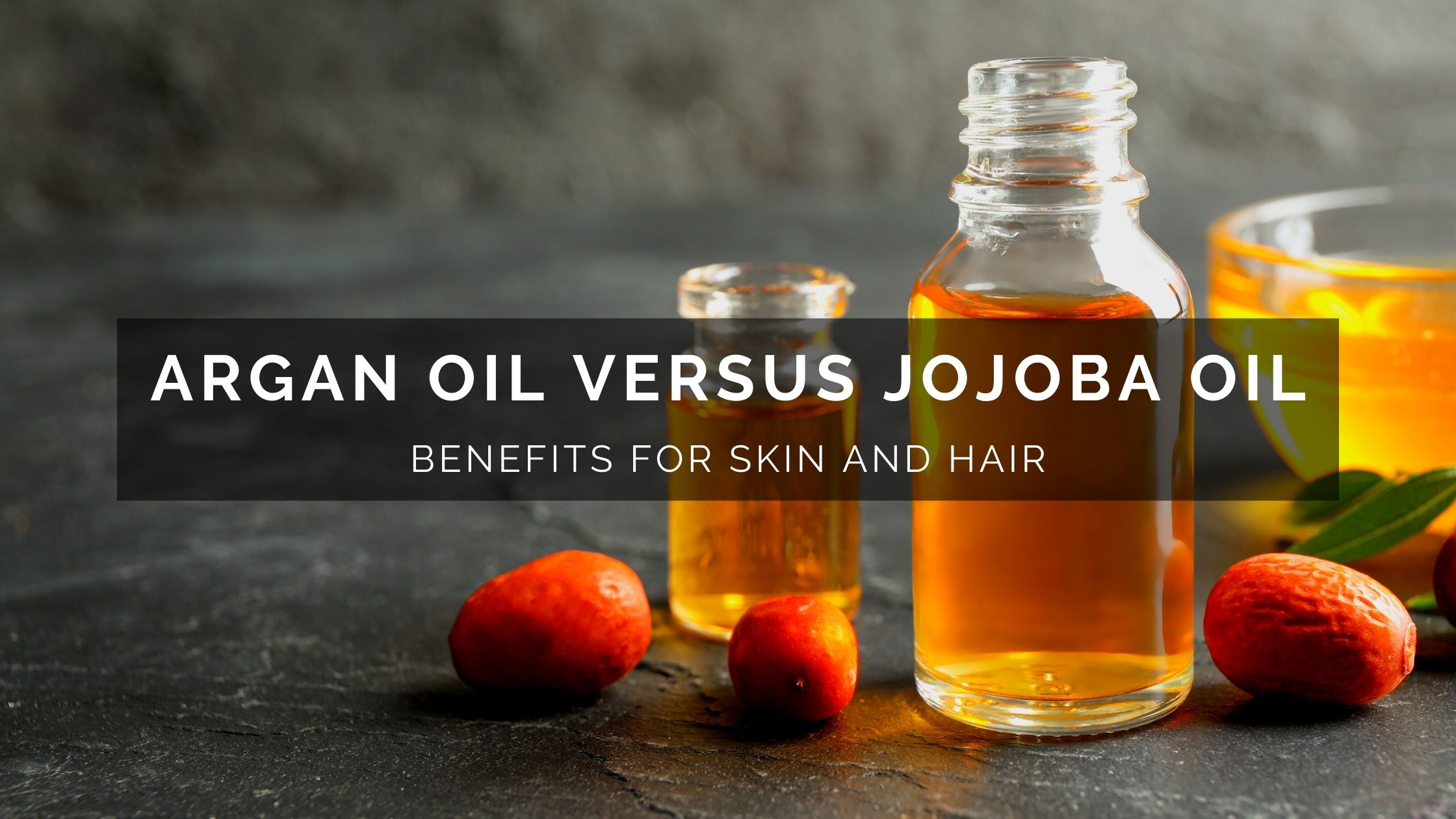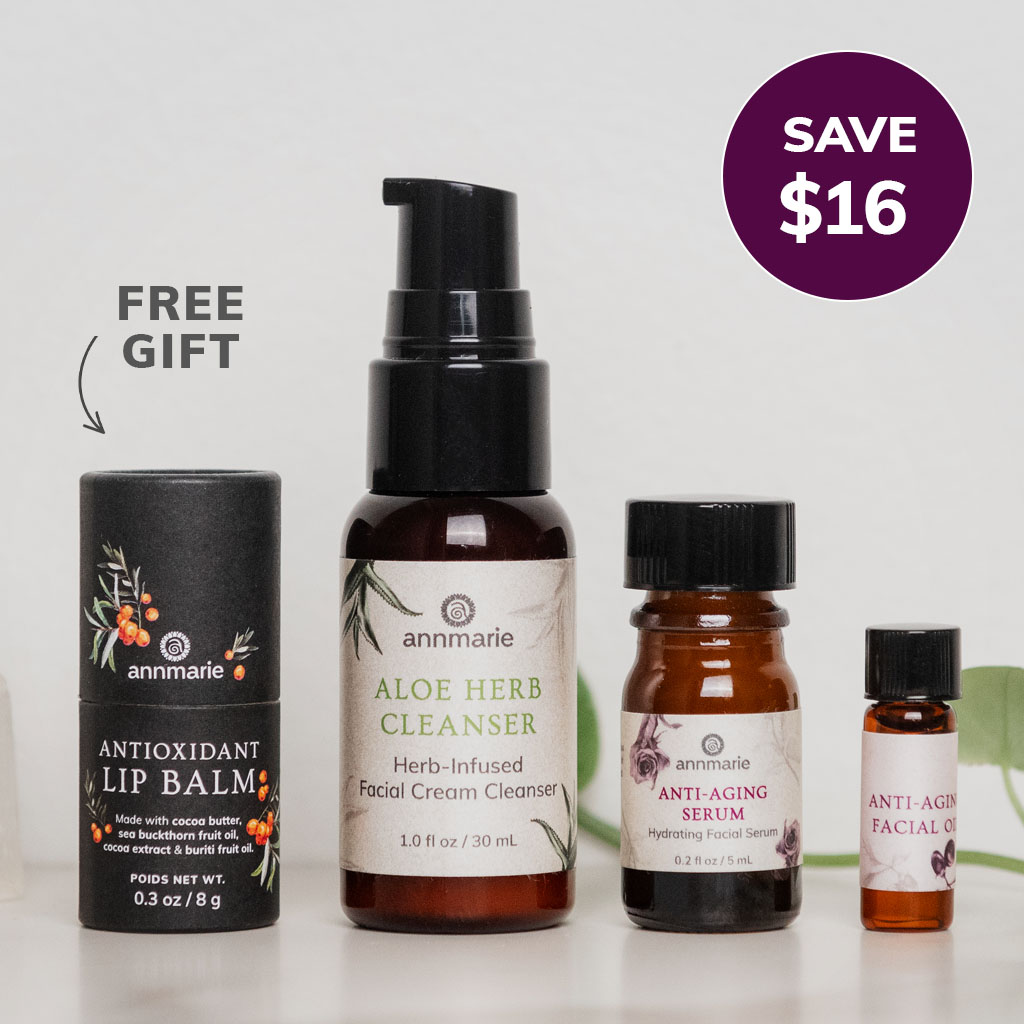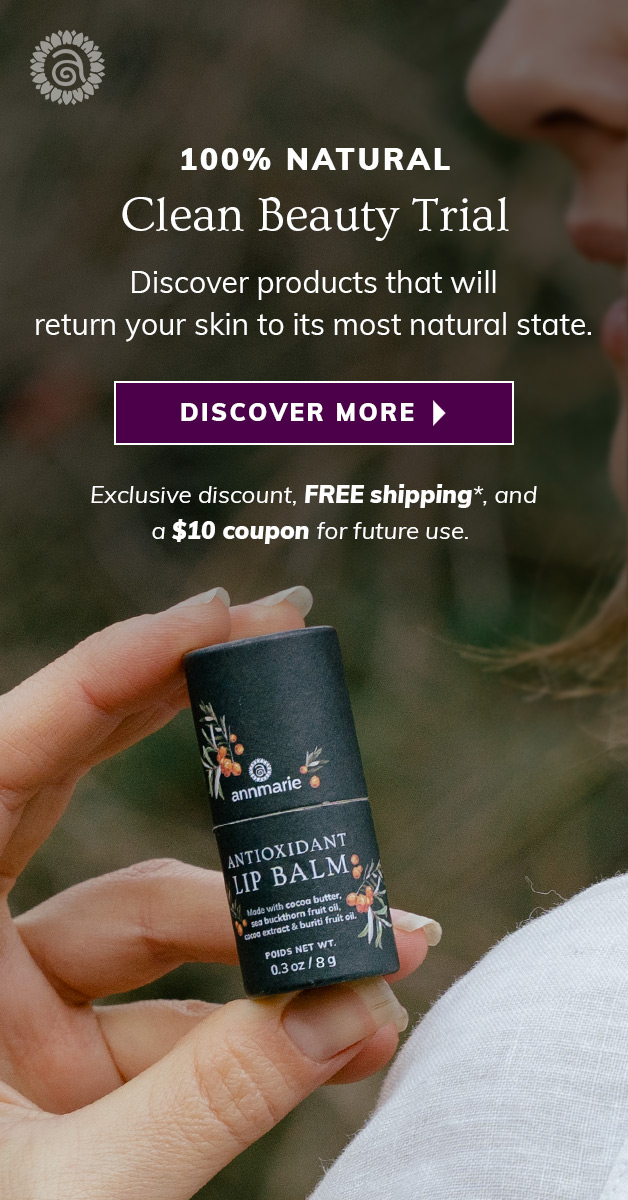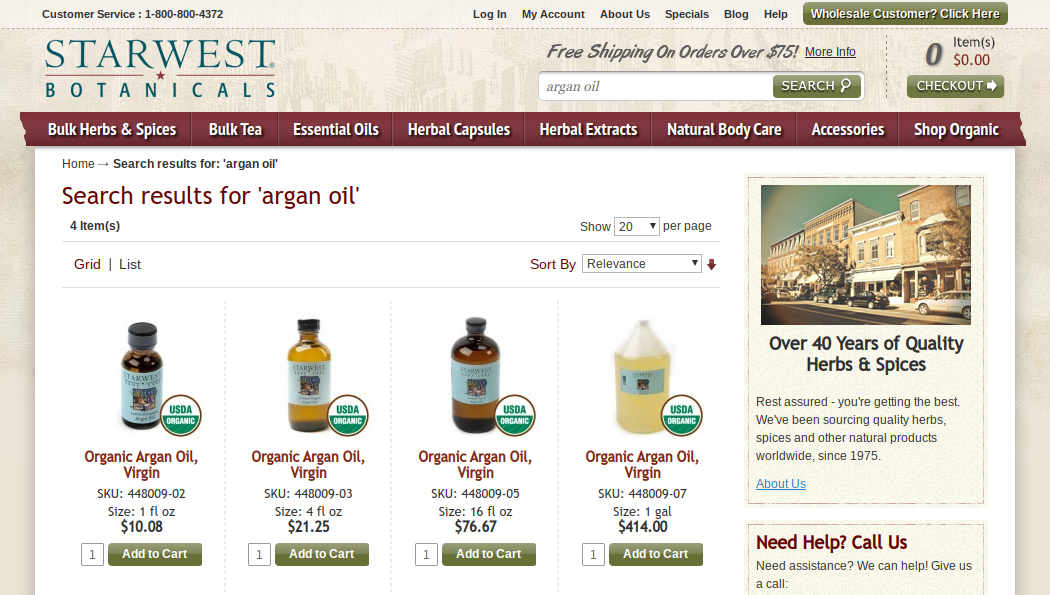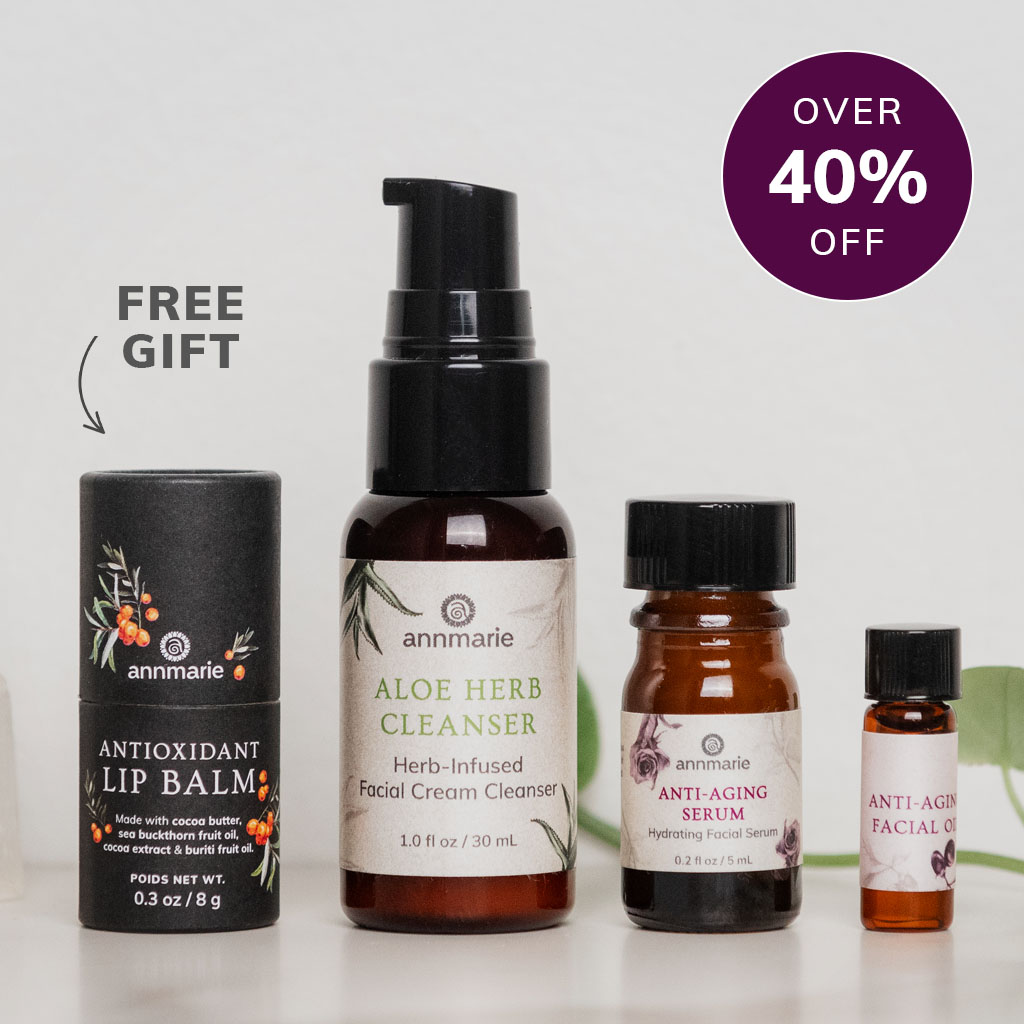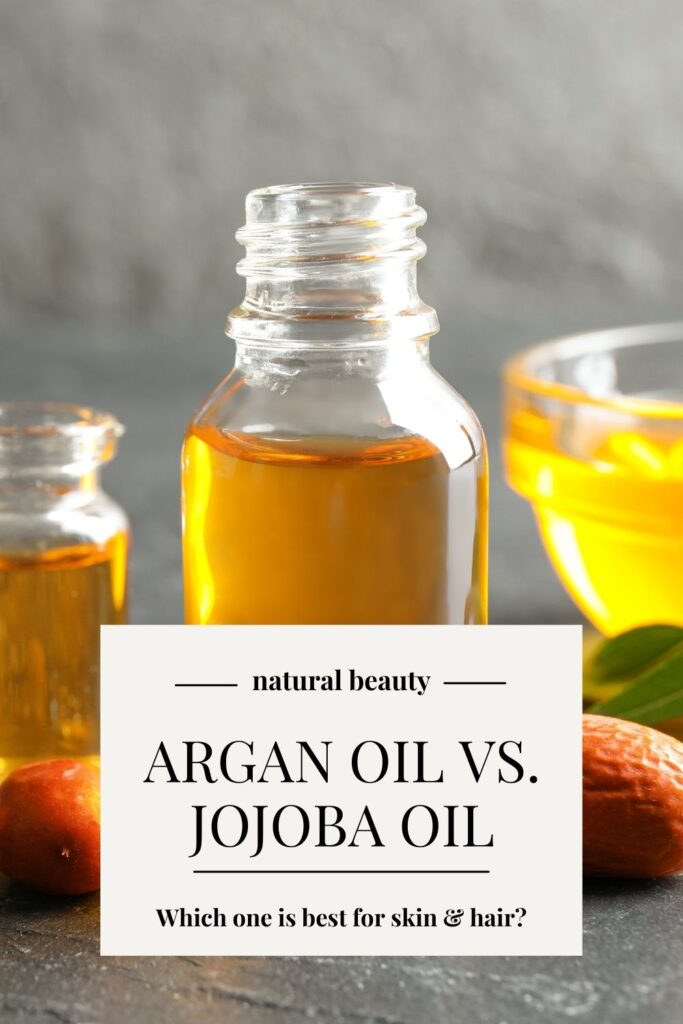Are you wondering which one to choose between Argan oil vs Jojoba oil? While everyone’s skin may respond differently, I will give you some pointers as well as a little background information about both of these beautiful oils.
Saying exactly how your skin or hair will react to either one of them is difficult. You’ll have to put them to the test. Both could potentially work out great, or another oil altogether might be a better fit for your skin.
Table of Contents
- Jojoba oil, a quick breakdown
- Argan oil, in a nutshell
- Oleic Acid & Linoleic Acid
- Jojoba Oil
- Argan Oil
- Argan oil vs Jojoba oil, which one is best for face care?
- Argan oil vs Jojoba oil, which one is best for hair care?
- Argan oil vs Jojoba oil: Comparing prices & availability
- Argan oil vs Jojoba oil: Summary
Jojoba oil, a quick breakdown
Jojoba oil is one of my all-time favorite oils. Due to the fact that its molecular structure is so similar to our own sebum, it is simply hard to top. Jojoba has something good in store for many skin types or issues.
- Oily skin and acne tend to benefit from Jojoba oil, even though it has a slightly higher comedogenic rating.
- Almost any other skin type or condition should too, including but not limited to dry and aging skin. Jojoba oil’s amazing ability to restore the skin’s balance makes it one of the most versatile oils available.
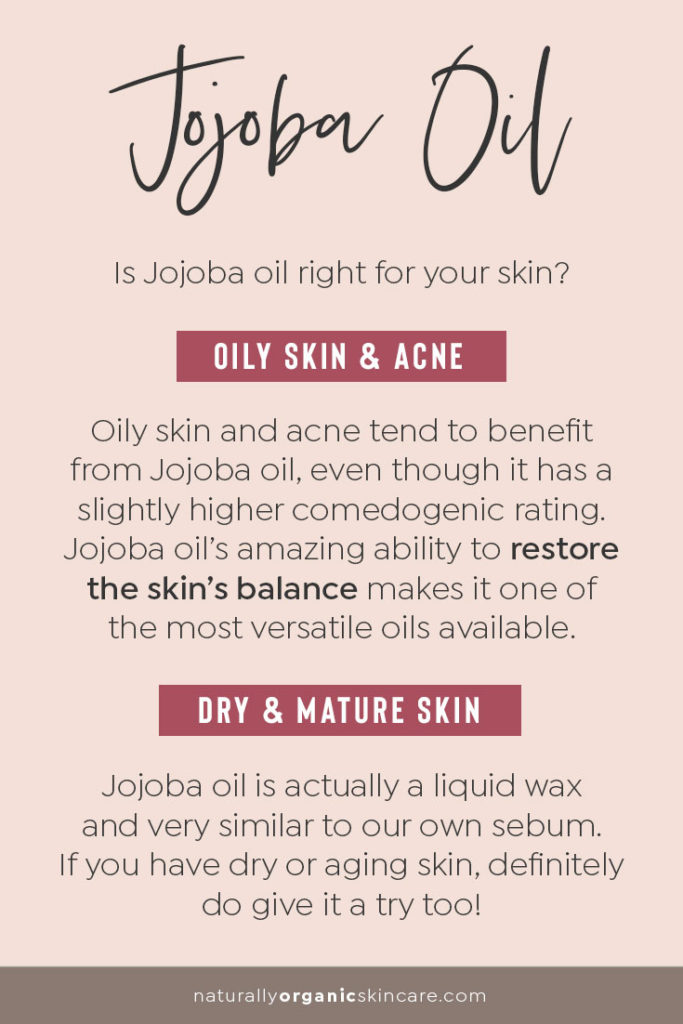
Argan oil, in a nutshell
Argan oil is quite famous for being wonderful – though I personally had less experience with this one until recently. For this post, and to brush up on its benefits for skin and hair care, I was excited to do lots of research… This so-called miracle oil from the desert must be called liquid gold for a reason!
- Argan oil is extremely nourishing to dry and/or more mature skin.
- Nourishing hair is another perfect use for it, especially for dry lengths, and brittle ends.
- Oily skin with acne can sometimes benefit from Argan oil, due to its anti-inflammatory properties. Some people report it has a healing effect on their acne, while others find it too heavy. It all depends on whether your skin tolerates it well.
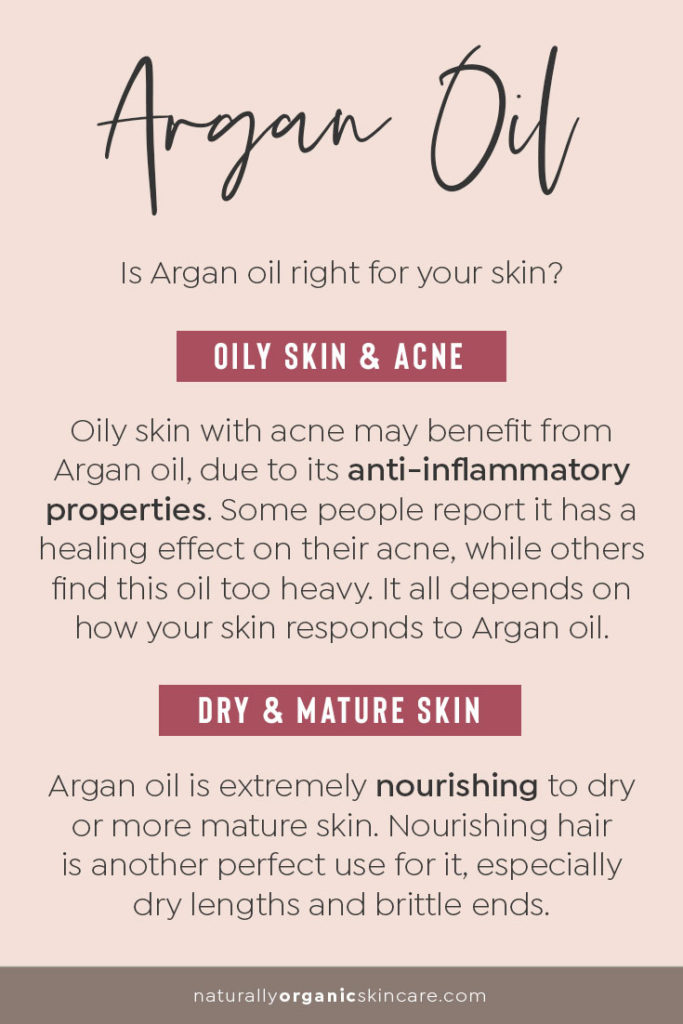
Both Argan and Jojoba oil are easy to purchase online, as well as in select local stores. Argan oil tends to be the more expensive one, but it depends on the brand. On Amazon, you can find both organic Jojoba oil and organic Argan oil. Both can be used pure, “as-is”. They can also be spruced up with a few drops of one or more of your favorite essential oils.
It won’t come as much of a surprise that Jojoba oil is a key ingredient in the Anti-Aging facial oil by Annmarie Gianni ($54.95 for 15ml) which you can sample here.
Acure Organics has a great facial oil with organic Argan oil – choose between coconut, rose, and citrus-ginger.
And you’ll see one or both pop up in the ingredients of natural tinted moisturizers, too. Check’em out here: Best Organic Tinted Moisturizers With SPF.
So, we’ve started with a quick overview. Now, let’s get down & dirty and take a more in-depth look at Argan oil vs Jojoba oil below.
Oleic Acid & Linoleic Acid
The following is helpful to know in relation to all oils and skincare, not just Argan and Jojoba.
Oils contain certain amounts of fatty acids.
Sounds familiar? Good! You may have heard of fatty acids in relation to skincare, but also cholesterol, healthy eating habits, anti-aging in general or cardiovascular health.
There are a whole lot of different kinds of fatty acids. The two terms to keep in mind when choosing the perfect oil for your skin are oleic acid and linoleic acid. If your skin tends to be oily, and maybe also struggles with some acne, it could be deficient in the second one: linoleic acid. An oil with a higher percentage of linoleic acid can be helpful in that case. A higher amount of the first one, oleic acid, tends to be present in oils we commonly call “heavier” or “richer”. This makes oils higher in oleic acid more suited to dry or mature skin.
Then again – and unfortunately – things aren’t necessarily as straightforward as that. The complexity of both oils and our skin makes it hard to determine “on paper” what works and what doesn’t. Finding the right oil(s) for your face, body, or hair (whether it be Argan oil vs Jojoba oil or another one altogether) usually involves some trial and error.
Jojoba Oil
Scientific name: Simmondsia Chinensis
Jojoba oil penetrates the skin easily without leaving a greasy feeling. Did you know that jojoba oil actually isn’t even oil at all? We just call it that – probably because of its liquid consistency – when it is technically a (fluid) wax.
Is Jojoba oil right for your skin?
Jojoba oil has calming and soothing properties. Jojoba oil’s chemistry is very similar to that of our own sebum. It is superb to combat both dehydration and wrinkles.
Because Jojoba oil’s molecular build is so similar to the skin’s own sebum, even oily skin with acne (I should say especially oily skin) can benefit from this versatile oil. When used on oily skin, whether with or without acne, Jojoba oil can really help balance the skin’s own oil production. This sounds like a paradox indeed, but it typically results in less oily skin.
Professional skincare with Jojoba oil
Jojoba oil basically can’t do much harm, no matter what your skin type is.
Worst case scenario, if you have very dry skin, you’ll find that it perhaps isn’t quite moisturizing enough on its own. (In the Anti-Aging facial oil by Annmarie Gianni mentioned above Jojoba oil is combined with 14 other oils!)
Being a liquid wax with a consistency that is so close to that of human sebum, Jojoba rarely causes issues/reactions. It almost always leaves the skin in better condition than it found it.
And if for some reason Jojoba oil doesn’t agree with you on its own? Then you can probably still use it, by blending Jojoba oil with another oil.
Argan Oil
Scientific name: Argan Spinosa
Argan oil has been on the radar of the beauty industry for some time. You’ve probably seen the mention “with Argan oil” on various skincare labels and shampoo bottles of both high-end and department-store products. Local health food stores often carry some more basic carrier oils such as castor and sweet almond oil. Pure Argan oil isn’t as easy to find offline, but it is widely available online.
There are so many different suppliers to choose from… Let me start off by throwing in an important tip: the best Argan oil is cold-pressed and from organic agriculture.
It can be challenging to find trusted sellers of Argan oil. Even more so since its massive gain in popularity over the past few years! Another thing you may want to watch for is whether a company practices fair trade. With Argan oil generally originating from poor countries, most of us will agree that it is important for a business to treat everyone well and pay fair wages.
Without getting too technical, let’s go over the properties of Argan oil and its potential benefits to your skin and hair.
Argan Oil Overview
Rich in vitamin E, Argan oil is known for its nourishing and regenerating properties. Argan oil is also a great antioxidant, which makes it a powerful ally in the fight against aging.
Argan oil is a richer oil. It doesn’t penetrate the skin as well as Jojoba oil. Mixing Argan oil with a second, more easily absorbed oil (such as Kukui nut oil or Rosehip seed oil) can help improve absorption. That being said, Argan oil does have an even lower comedogenic rating than Jojoba oil.
Being an anti-aging and nourishing powerhouse, argan oil contains a lot of natural antioxidants that protect the skin from aging. Argan oil has antifungal, antiviral, and anti-inflammatory properties.
While Argan oil is great to make the skin softer and more supple, it may be just a tad too rich if your skin is oily. It mainly protects against premature aging, improves the skin’s function as a barrier, as well as protects from the outside world.
Argan oil does offer some protection from UV rays, but please note that oils are never a substitute for proper sunscreen lotion.
The amount of fatty acids in Argan oil varies between batches and brands. These are the (approximate) numbers:
- Polyunsaturated fatty acids (linoleic acid/omega 6/vitamin F): 29-36%
- Mono-unsaturated fatty acids (oleic acid): 42-49%
- Saturated fatty acids (stearic acid & palmitic acid): stearic acid 6-7% & palmitic acid 13%
Unsaturated fatty acids, which Argan oil has a high content of, are protecting, nourishing, regenerating, work against premature anti-aging, and help to make the skin more soft and supple.
Is Argan oil right for your skin?
Argan oil is very good for dry and aging skin, as you can tell from all its regenerating properties mentioned above. It is also supposed to be potentially great for oily skin with acne, because of its anti-inflammatory properties. Some people report improvement of their acne when they start using Argan oil, while it totally doesn’t work for others.
If you look at just the linoleic acid content of around 35% in Argan oil, it makes sense that it would work well for oily skin and acne. Jojoba oil contains a much lower amount of linoleic acid – around 5%. However, Argan oil is also fairly high in oleic acid (approx. 45%). This may be too much if you already have oily skin since the oils high in oleic acid are generally more suited to dry skin types.
Honestly, it could be hit or miss. f you try Argan oil and it works for you, terrific! If not, don’t worry. Being stuck with a bottle of Argan oil that isn’t doing what you hoped as a facial oil also isn’t the worst thing. It has many other potential uses and won’t have to go to waste. It makes a great anti-frizz oil for the hair, nourishes dry and brittle ends, and can be helpful on the body for stretch marks, hands, and feet.
Argan oil vs Jojoba oil, which one is best for face care?
While my skin has been team Jojoba for pretty much always, when stumbling upon this Argan oil I decided to take the leap. The research for this article got me convinced I’d been missing out!
Jojoba oil has been one of my favorite oils for face care for years. Being in my mid-thirties, I am starting to look for anti-aging skincare products instead of skincare to control acne.
While my skin’s relationship with Jojoba oil has always been great, I’m also a lifelong fan of Rosehip seed oil. Argan oil can now be added to the list of favorites.
There are so many wonderful oils you can use for skincare, the hardest part is choosing. Not to mention, they can be mixed and even combined with one or more anti-wrinkle essential oils.
As mentioned earlier: if you’re wondering whether one of these oils or maybe both, could work well for your face, the only way to know for sure it to try them and observe your skin’s reaction. Should Argan oil appear too heavy, you can obviously stop using it and instead make it into a luxurious body oil for the body. I don’t think legs, elbows, or feet will ever say no to some extra moisturizing. Argan oil would also be a super-nutritive hair treatment.
Based on my own experience, I’d still advise Jojoba oil if you’re dealing with mild to heavier acne, oily skin, visible pores, or just have fairly normal skin – perhaps only prone to an occasional breakout. Then again, for dryer and aging skin, Jojoba oil would also be great.
From what other people are saying, Argan oil can be a bit of a hit or miss. Either it works great for you, or it does not at all. After using Argan Oil, I’ve definitely lost some of my bias toward Jojoba oil. 😉
Looking at Argan oil vs Jojoba oil, the latter is a safer bet for oily skin that can be prone to breakouts. The first is certainly worth a try for dry or mature skin and could work even if you have acne. For hair care, especially on the lengths, Argan oil rocks.
If you’re looking to explore something different, do check out Argan oil vs Coconut oil. The latter is not ideal for everyone’s face but worth looking at for hair and body care.
Argan oil vs Jojoba oil, which one is best for hair care?
The infinitely small droplet of argan oil in shower gel or shampoo is really not more than a marketing gimmick. It won’t do much for your skin or hair.
If you’d like to get a taste of the benefits of Argan oil vs Jojoba oil for your hair, you’ll need to experiment with a small bottle of pure oil. Should this appear too rich in itself, blending with a lighter oil could be nice.
Apply the oil very sparingly – otherwise, it will just sit on top of your skin anyways… or soak your clothes with oil. A little goes a long way.
Argan oil vs Jojoba oil: Comparing prices & availability
Aura Cacia’s organic Argan Oil is lovely. I picked it up at Target, but it’s, of course, friendlier-priced through Amazon. Local so-called health food stores might also have it.
But Amazon isn’t the only place to shop – especially if you don’t have free shipping through Prime, there’s no real reason to limit yourself to Amazon. Or perhaps you like supporting smaller, independent shops instead of the all-devouring giant of online retail.
Starwest Botanicals is a great place to find pure oils, essential oils, and even tea, herbs, spices, and some skincare. They have organic argan oil in four sizes, and the price tag is friendly.
One of the many bottles of jojoba oil you can find on Amazon (The last jojoba oil I used was from Desert Essence):
There are so many others. You could spend a good day reading reviews! Another option again is Starwest Botanicals’ jojoba oil, which comes in the same spread of sizes as the argan oil.
Argan oil vs Jojoba oil: Summary
How to choose between Argan oil versus Jojoba oil: The first is nicknamed liquid gold, and the second is the most similar substance to our own sebum.
Balance, regenerate, and soothe your skin with one of these amazing oils. You can also nourish your hair with Argan oil, or treat the oily scalp with Jojoba oil.
Argan oil is richer in both oleic acid and linoleic acid. Jojoba oil contains much less of both oleic acid and linoleic acid and isn’t technically an oil but a liquid wax.
The chemical makeup of Jojoba oil is one of the closest things to our own sebum, which makes Jojoba oil a great choice to balance almost any skin type or issue.
Argan oil has promising properties as well. It is regenerating and can work as a powerful anti-inflammatory.
As long as it isn’t too rich for your skin, argan oil can do wonders. Jojoba, on the other hand, is more of a friend to everyone’s skin type.
In the race between Argan oil vs Jojoba oil, Argan stands out as the oil that is healing, protecting, and nourishing. Jojoba wins the versatility award and is the safest bet for all skin types.
Another oil worth considering is rosehip oil: Rosehip Oil vs Jojoba Oil: Find Your Skin’s Perfect Match. Especially if you have dark spots, sun damage, aging skin, or acne (and maybe a few scars), rosehip oil is a huge asset.
Here are a few other comparisons that you might find interesting:
- Argan Oil vs Rosehip Oil: Transform Your Beauty Routine
- Argan Oil vs Coconut Oil for Skin & Hair Care
- Mango Butter vs Shea Butter: Comparing Skincare Superpowers
- Best Carrier Oil for Sensitive Skin: 10 Top Choices for Gentle Care
- Essential Oils to Tighten Pores: The Secret to Smooth, Clear Skin
Argan & Jojoba Oil in Natural Organic Skin Care Products
One of my favorite natural and organic lines, Annmarie Skin Care, uses jojoba oil in their Anti-Aging facial oil, and both argan and jojoba are ingredients in their Radiate facial moisturizing oil. (Those are affiliate links. But… before you go ahead and click, read on.)
Of course, you could get these individual products, but you might like to check out this special sample kit offer first.
It contains anti-aging facial oil, plus two other great products and a free natural sunscreen lotion. The perfect little kit if you want to try out the brand without committing to full size just yet.
This creamy facial cleanser by 100% Pure uses Argan oil for dry skin care.

Moisturizing Makeup Remover. Rich and creamy cleanser moisturizes and nourishes while g… [More]
